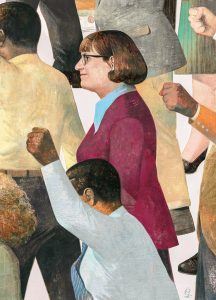Nathan Heller in The New Yorker:
 American stories trace the sweep of history, but their details are definingly particular. In the summer of 1979, Elizabeth Anderson, then a rising junior at Swarthmore College, got a job as a bookkeeper at a bank in Harvard Square. Every morning, she and the other bookkeepers would process a large stack of bounced checks. Businesses usually had two accounts, one for payroll and the other for costs and supplies. When companies were short of funds, Anderson noticed, they would always bounce their payroll checks. It made a cynical kind of sense: a worker who was owed money wouldn’t go anywhere, or could be replaced, while an unpaid supplier would stop supplying. Still, Anderson found it disturbing that businesses would write employees phony checks, burdening them with bounce fees. It appeared to happen all the time.
American stories trace the sweep of history, but their details are definingly particular. In the summer of 1979, Elizabeth Anderson, then a rising junior at Swarthmore College, got a job as a bookkeeper at a bank in Harvard Square. Every morning, she and the other bookkeepers would process a large stack of bounced checks. Businesses usually had two accounts, one for payroll and the other for costs and supplies. When companies were short of funds, Anderson noticed, they would always bounce their payroll checks. It made a cynical kind of sense: a worker who was owed money wouldn’t go anywhere, or could be replaced, while an unpaid supplier would stop supplying. Still, Anderson found it disturbing that businesses would write employees phony checks, burdening them with bounce fees. It appeared to happen all the time.
Midway through summer, the bank changed its office plan. When Anderson had started, the bookkeepers worked in rows of desks. Coördination was easy—a check that fell under someone else’s purview could be handed down the line—and there was conversation throughout the day. Then cubicles were added. That transformation interrupted the workflow, the conversational flow, and most other things about the bookkeepers’ days. Their capacities as workers were affected, yet the change had come down from on high.
These problems nagged at Anderson that summer and beyond. She had arrived at college as a libertarian who wanted to study economics. In the spirit of liberal-arts exploration, though, she enrolled in an introductory philosophy course whose reading list included Karl Marx’s 1844 manuscripts concerning worker alienation. Anderson thought that Marx’s economic arguments about the declining rate of profit and the labor theory of value fell apart under scrutiny. But she was stirred by his observational writings about the experience of work. Her summer at the bank drove home the fact that systemic behavior inside the workplace was part of the socioeconomic fabric, too: it mattered whether you were the person who got a clear check or a bounced check, whether a hierarchy made it easier or harder for you to excel and advance.
More here.
